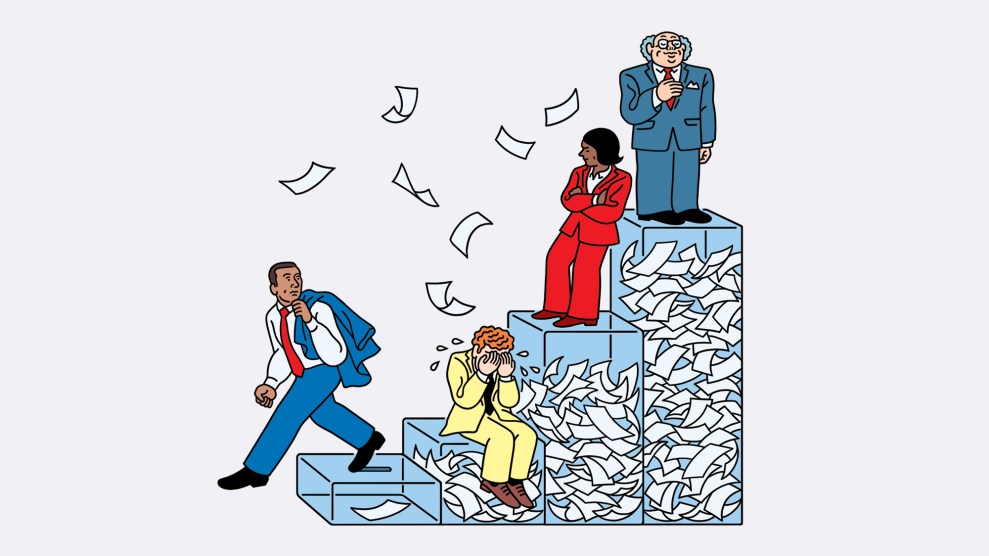 As part of our special investigation “Mission Creep: US Military Presence Worldwide,” we asked a host of military thinkers to contribute their two cents on topics relating to global Pentagon strategy. (You can access the archive here.) The following dispatch comes from C. Douglas Lummis, a former US Marine who teaches at Japan’s Okinawa International University, and the author of Radical Democracy.
As part of our special investigation “Mission Creep: US Military Presence Worldwide,” we asked a host of military thinkers to contribute their two cents on topics relating to global Pentagon strategy. (You can access the archive here.) The following dispatch comes from C. Douglas Lummis, a former US Marine who teaches at Japan’s Okinawa International University, and the author of Radical Democracy.
Pentagon Promise Breakers: Friday the 13th in Okinawa
In her article “How to Stay in Iraq for 1,000 Years,” Frida Berrigan takes up the issue of status of forces agreements (SOFAs), those treaties that determine the standing of US troops based or operating in foreign countries. She mentions that the special privileges granted under the US-Japan SOFA have been a particular source of resentment in Okinawa, where time after time GIs who had committed crimes against Okinawans were spirited away by US military police and disappeared, apparently transferred back to the US, leaving it unclear whether they were ever charged in a military court.
The Okinawa experience brings into focus the humiliation of this extraterritoriality, but a recent incident here raises another question: When push comes to shove, to what extent is the US military willing to abide by even its own agreements?
In August 2004, on Friday the 13th, a helicopter from the US Marine Air Station at Futenma smacked into the side of a building inside Okinawa International University, fell to the ground, exploded, and burned. Miraculously, no one other than the crew was injured. But what happened afterward was just as extraordinary.
Immediately, scores of Marines came pouring over the fence (the base and the university are back-to-back), and occupied the university. They set up a cordon of yellow tape around the accident site, and kicked out not only reporters and cameramen, but also the Okinawan firemen who had come to put out the blaze, the local police who had come to investigate the cause of the accident, and even the mayor of the town.
That evening a friend drove me through some backstreets, avoiding roadblocks, and we managed to get into the university, as far as the yellow tape blockade. Standing behind the tape was a line of Marine MPs, pistols on their belts. Behind them, Marines were dismantling the wrecked helicopter and loading it into trucks (from a police standpoint, destroying the evidence).
This behavior naturally drew a lot of protest, but most Okinawans came to the same conclusion: It only proved once again that the SOFA needed to be revised. Wondering about this, I found a copy of the agreement and searched for the clause that permits the US military to occupy turf outside its bases.
There is no such clause.
Moreover, concerning the right of MPs to operate outside their bases, the SOFA is clear. If American GIs are making, or involved in, some kind of trouble off base, then US military police may, after notifying Japanese police of their intentions, go to where the trouble is and use their police powers against those GIs. But the MPs have no police powers over Japanese citizens outside the bases.
So what were those pistols, then? We can be sure that Marine MPs don’t go on duty carrying empty pistols. And the fact that they were carrying pistols was surely a big factor in their success in extracting obedience from the people they were keeping outside the cordon. But under the existing SOFA, they had no legal basis for threatening people outside the base with violence. (Make no mistake: When someone carrying a gun issues an order, that is a threat of violence.)
When a military unit, carrying weapons, takes control of a piece of foreign territory without the permission of that territory’s government, what do we call it? The proper term, I believe, is a military incursion. The occupation of Okinawa International University was small-scale and short-lived, and, fortunately, no one was hurt. But in the context of international law, that’s what it was.
The incident is telling as to how the US military understands its status in foreign countries. That is, it will obey the status of forces agreements when it’s no big inconvenience, but in the case of a crisis, it will operate at will.
In the case of Okinawa, should the US ever get involved in a war with a nearby enemy—so far the US has used its Okinawa-based forces only against enemies that lack the capacity for long-range retaliation—we can be sure that the military will treat the entire archipelago, and not just certain designated areas, as its base. Of course, this could be a special characteristic of Okinawa, which the US military, and especially the Marine Corps, still partly views as its own turf, the spoils of an earlier war. Maybe in some other countries the military will be more respectful, even in crisis, of local sovereignty. But I wouldn’t be too sure.
More Dispatches
Robert Kaplan
Katherine McCaffrey
Winslow Wheeler
Steven Metz
Douglas Macgregor
John Nagl
William Hartung
John Lindsay-Poland
John Feffer
Catherine Lutz
Peter Beck
Nick Turse
John Pike
Mark Selden















